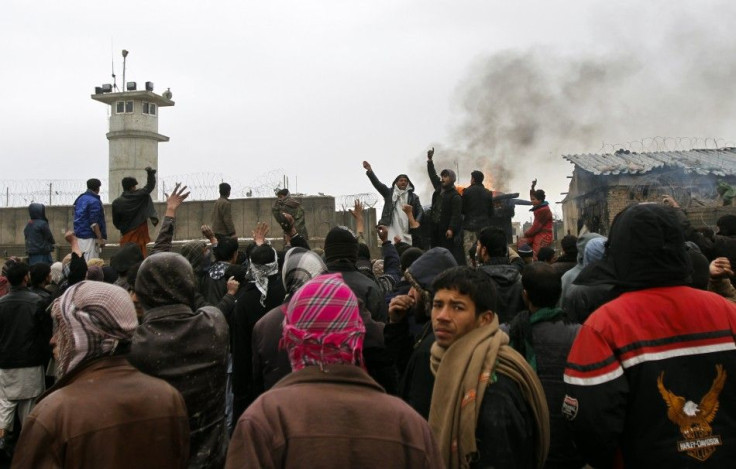Little Fanfare Over U.S.-Afghan Jail Transfer, But Bagram Is A Big Deal
ANALYSIS

Control over a major detention facility at Afghanistan's Bagram Air Base was passed from the U.S. military to the Afghan government on Monday.
"We transferred more than 3,000 Afghan detainees into your custody... and ensured that those who would threaten the partnership of Afghanistan and coalition forces will not return to the battlefield," said Army Col. Robert Taradash during a ceremony, according to the BBC.
The jail, called Parwan Detention Center, will now be headed up by Afghan Army Gen. Ghulam Farouk. But this is not a total handover -- hundreds of detainees will remain under U.S. supervision.
Monday's ceremony was low on fanfare; Taradash was the only U.S official in attendance. But the Parwan handover is a major event, not least because the Bagram Air Base has a long history of military significance and, by extension, a symbolic importance.
It first served as a base of operations for Soviet troops when they occupied Afghanistan during the 1980s. After their withdrawal, the Bagram facilities were badly damaged by ongoing sectarian violence, falling by turns under control of both Taliban insurgents and their adversaries in the Northern Alliance.
NATO troops took over the base in 2001, and U.S. forces have since made Bagram one of their most important posts in an 11-year offensive against al-Qaeda and affiliated insurgents. Bagram is located just 27 miles north of Kabul, which is the seat of the U.S.-backed government led by President Hamid Karzai.
But for all its strategic significance, Bagram has become the unfortunate epicenter of ongoing friction between Afghan people and U.S. troops. It was here that American security personnel tortured and killed several prisoners, drawing international condemnation. The issue came to light most glaringly in a 2005 report from the New York Times, at which point the U.S. Pentagon spokesman Larry Di Rita carefully acknowledged the severity of the problem.
"What we have learned through the course of all these investigations is that there were people who clearly violated anyone's standard for humane treatment," he said. "We're finding some cases that were not close calls."
It was also at Bagram that U.S. military personnel inadvertently threw copies of the Quran into an incinerator this February, sparking countrywide protests that killed more than 40 people. The incident was significant enough to elicit a sincere apology from U.S. President Barack Obama to Karzai and the Afghan people.
Today, Afghanistan's fraught transition is something of a neglected subject in the United States -- even as the American public gears up for a pivotal presidential election this November. But Afghans themselves know Bagram very well, both as a symbol of foreign military presence in their country and an incidental hub of cultural tension.
That's why Bagram prison handover to Afghan personnel -- even if it is an incomplete transfer -- is no small affair.
Of course, serious difficulties continue to plague the Afghan government as it works to improve domestic security before the official withdrawal of NATO troops in 2014.
Terrorist attacks are a frequent occurrence; on Monday, at least 16 people were killed by a suicide bomber at a busy intersection in Kunduz. Also on Monday, it emerged that financial records regarding Afghanistan's fuel purchases have been destroyed, casting more doubt on the efficacy of American reconstruction funding and other assistance.
But the administration in Kabul is right to see the Parwan transfer as a step in the right direction for Afghan sovereignty.
"Our Afghan security forces are well-trained and we are happy that today they are exercising their capability in taking the responsibility of prisoners independently and guarding the prisoners," said Afghanistan's acting Defence Minister Enayatullah Nazari.
"We are taking the responsibility from foreign forces."
© Copyright IBTimes 2024. All rights reserved.






















